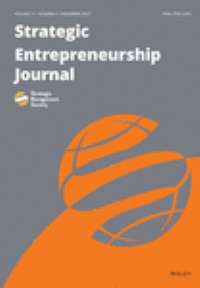微型风险投资
IF 6.3
2区 管理学
Q1 BUSINESS
引用次数: 0
摘要
最近,风险投资(VC)行业经历了几家新的资本提供者的进入。利用2000年至2022年美国投资者及其投资组合初创公司的数据,我们记录了一种新型投资者的出现:微型风险投资家。分析表明,微型风险资本家具有不同于传统风险资本家的特殊投资策略。与这些投资者相比,微型风投投资于风险较高的初创企业,即由经验不足的创始人发起的早期企业;然而,微型风投公司不太可能联合起来,进行投资,并取代初创公司的创始人。此外,与传统风投支持的创业公司相比,由微型风投资助的创业公司成功退出的可能性更小。这些结果可以追溯到较小的资本禀赋、不太成熟的有限合伙人和较少的人力资本,这些都是微型风投所处置的,这可能会促使他们将微薄的资本分散到许多投资中,以最大化回报。我们的分析还揭示了微型风投和商业天使在策略上的重要差异。本文章由计算机程序翻译,如有差异,请以英文原文为准。
Micro venture capital
Recently, the venture capital (VC) industry has experienced the entry of several new capital providers. Using US data on investors and their portfolio startups from 2000 to 2022, we document the emergence of a new type of investors: the micro VC. Our analysis reveals that micro Vencture Capitalists (VCs) have an idiosyncratic investment strategy, which differs from traditional VCs. Compared with these investors, micro VCs invest in riskier startups, that is, early-stage ventures initiated by less experienced founders; yet, micro VCs are less likely to syndicate, stage their investments, and replace the startup founders. Additionally, startups funded by micro VCs are less likely to experience successful exits than those backed by traditional VCs. These results can be traced to a mix of smaller capital endowments, less sophisticated limited partners, and lesser human capital of which micro VCs dispose, and that may induce them to spread their thin capital across many investments to maximize returns. Our analysis also uncovers important differences in the strategies pursued by micro VCs and business angels.
求助全文
通过发布文献求助,成功后即可免费获取论文全文。
去求助
来源期刊

Strategic Entrepreneurship Journal
Multiple-
CiteScore
11.10
自引率
1.60%
发文量
31
期刊介绍:
The Strategic Entrepreneurship Journal is a research journal that publishes original work recommended by a developmental, double-blind review process conducted by peer scholars. Strategic entrepreneurship involves innovation and subsequent changes which add value to society and which change societal life in ways which have significant, sustainable, and durable consequences. The SEJ is international in scope and acknowledges theory- and evidence-based research conducted and/or applied in all regions of the world. It is devoted to content and quality standards based on scientific method, relevant theory, tested or testable propositions, and appropriate data and evidence, all replicable by others, and all representing original contributions. The SEJ values contributions which lead to improved practice of managing organizations as they deal with the entrepreneurial process involving imagination, insight, invention, and innovation and the inevitable changes and transformations that result and benefit society.
 求助内容:
求助内容: 应助结果提醒方式:
应助结果提醒方式:


